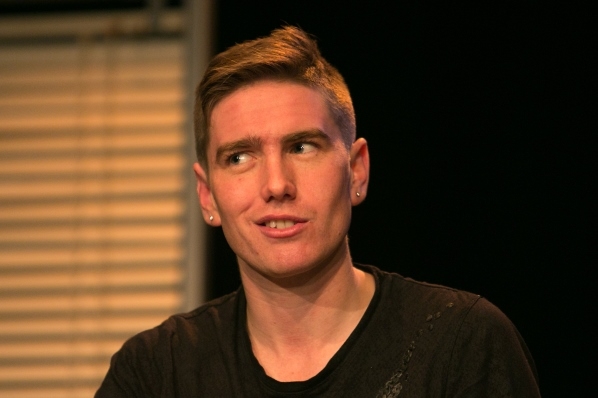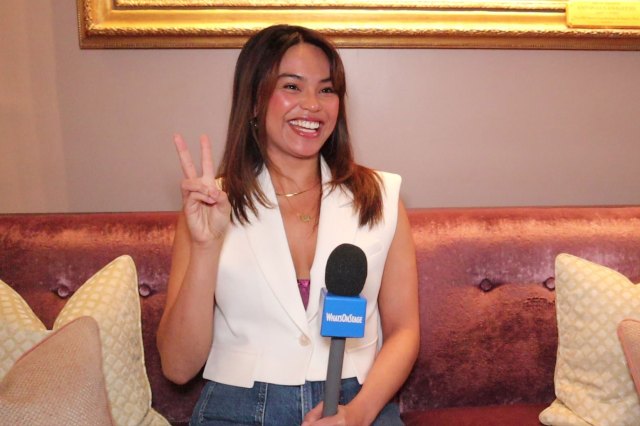Brief Encounter with … Away From Home's Rob Ward and Martin Jameson
”Away From Home” wowed Manchester audiences last Summer as part of the city’s 24:7 Theatre Festival. This one man play features co-writer Rob Ward as a gay footballer. We caught up with Rob and co-writer/director Martin Jameson, as the play tours the UK.

Can you tell us a bit about the play?
Rob Ward:
Away From Home looks at the homophobic culture within football through the relationship between a male escort and a Premiership footballer. Kyle is in many ways your typical twenty-something, lager supping football fan – only one who earns his living through secret phone calls from Vince, his 'employer'. When he takes a call one night to meet 'somebody very, very important' he finds himself falling for one of the country's top footballers, all played out in secrecy and hidden from his family and friends. The play looks at the complications that arise when falling in love if sex has only ever been a transaction and with the footballer struggling to step out of the closet and into the unknown.
Martin Jameson: Away From Home tells the story of a male escort, Kyle, who seems outwardly comfortable with a life based around transactional sex. One night, he is employed by a closeted gay footballer, who keeps his secret by only having sex on a similarly transactional basis. Things really kick off when Kyle and the footballer fall in love and 'transactions' are no longer enough.
Where did you get the idea from?
RW:
I have for years wanted to write something about my experiences being a gay football fan with the homophobic language that has become an unchallenged part of the vernacular of too many football fans. One of the problems that Martin and I felt when I first spoke with him about the idea was that representations of fictional players and teams is tricky with football being such an enormous part of our culture. By telling the story from the point of view of an escort who is hired by the footballer, and with the decision being made to make it a one man show, we both felt like we had found a way in as we would not be required to name teams or player names. We could tell the story through the eyes of the person closest to the closeted sportsman and make the audience connect to the story through their reaction to Kyle. This also gave us the ability to tell a story that felt very real – one man needing anonymity and the other man making a living through ensuring precisely that.
MJ:
I met Rob directing him a couple of years back in another play, after which he approached me wanting my advice about writing a play about homophobia in football. I've been writing TV and radio for twenty years or so (I'm a regular writer for shows like Holby City and Casualty) and directing for at least another decade so I think he wanted to plunder my raddled old gunslinger's box of tricks. I know diddly about football, but as chance would have it, I'd been sitting on a story I'd heard – from a reliable source – about a well known footballer and his relationship with a male escort. This seemed like the perfect opportunity to give it dramatic life working with someone who lives and breathes football as Rob does. And it seemed like the perfect vehicle for the subject that Rob wanted to tackle. Two characters both have secret lives – defined to a large extent by homophobia – but what happens when they fall in love, and the secret becomes untenable?
How difficult is it to perform?
RW:
Performing a one man show is both difficult and not difficult for the same reason; its only you out there! It is incredibly difficult because of the mental and physical requirements and the sheer concentration you have to maintain, yet at the same time it gives you a fantastic sense of control and freedom on a stage where you can dictate the pace and build a relationship with the audience. Its a rare opportunity I think for an actor, a one man show, and it is one that I have really enjoyed and learned so much more about acting along the way.
MJ:
From a directors point of view the challenge has been to give Rob complete command over the material, and the confidence to 'own' it both in terms of the words on the page, but also in terms of the intense physicality of the piece. Rehearsals were great fun. We had written the play together, spending about a month working on the story (story is the key to any strong script) and then passing the script back and forth between us from draft to draft. So we knew the material very well to start with, but in bringing it to the floor, we started to pull it apart, to trim, rewrite and question every word, every comma, every movement. The idea was that nothing that happens on stage should be extraneous. Every single prop and bit of set is used in some way, and every single moment or fraction of a moment has a purpose and an intention. If we've done our job right, there's something happening, an action or a nuance in every second that Rob is on stage, sometimes several things in a single second. That's a lot of information and physical discipline for a single actor, with no time reacting, or standing off stage, or with another performer to share the load. Rob plays about ten characters in the piece, and has to flit seamlessly from one to the other sometimes playing three characters at once, engaged in quick fire dialogue with himself. Like I say, I've been around theatre and telly for longer than I care to admit sometimes, but what Rob does on stage is about as impressive as anything I've witnessed in my career as a director.
The response has been great so far. Does this add anything the performances?
RW:
I suppose with such positive response comes high expectations which can be daunting, but it also gives you a base level of confidence that if there is such expectation you must be doing something right. And I always have to remind myself (something which might sound obvious) that an audience really do want to be entertained. I think sometimes as an actor you can feel like an expectant crowd are more difficult to win over because they are challenging you to impress them. You can forget that they are having a night out and wanting to be entertained. If the audience are enjoying the show, through laughter or silence, then you feed of it.
MJ:
Every show is different, according to how the audience respond, and the joy of what Rob does on stage is that he is able to respond and adjust timing and tuning as he goes. I think it keeps things fresh and the show is still growing as Rob explores the different ways that audiences react.
Why do you think audiences engage with the play?
RW: I would like to feel that an audience, whilst acknowledging that this is a piece tackling (pardon the pun) a serious issue, it isn't tub thumping or preachy but instead attempts to tell a story about human gain and loss. We follow a young guy who can be as charming as he can be deeply divisive and his behaviour is by no means always condonable. I think audiences can relate to flawed characters, a reminder that none of us are without imperfection, and Kyle will turn on them as quickly as he will confide in them, always keeping them on their toes.
MJ: The key to any one person show is how the narrator is pitched. And the best narrators are likeable – but unreliable. The audience feel that they know and like Kyle, but they can see his faults, and are drawn into his story because they want him to find his way through it, to sort himself out. Kyle is constantly battling with people who are giving him serious earache, but the audience can see that by and large those other voices are telling the truth, no matter how hard Kyle tries to ignore them.The play is Kyle's journey, his battle with himself, and that is something we all recognise.
Do you think gay representation in theatre has moved on?
RW: Gay writers have been integral in the development of theatre from Wilde to Ravenhill and I think its interesting how representations of gay characters are changing. I think we are now seeing a wider range of the LGBT community in plays that are responding to the issues that continue to effect gay men and women around the world. Whilst 'coming out' remains a very important thing for anyone who has to do it, we are seeing that as society becomes more and more accepting we have gay characters for whom that isn't the main issue. I think we are starting to get much more diversity on display in gay theatre as indeed there is within the wider gay community.
MJ: Massively. When I was first working in theatre gay characters were either archly camp, bitterly comic, or tragic, afflicted by nazis or AIDS. Or a mixture of all four. It's a great thing that society has moved on, and that generally – except in football! – it is accepted that being Gay is in fact…. normal. This is liberating, because this means that Kyle can be an arsey gobshite – he is not a standard bearer for his sexuality.
How important is regional theatre to the UK?
RW: At its best theatre can spread a conversation and its simply vital that all parts of the UK remain in that conversation.
MJ: Away From Home is a play rooted in its regional origins. The story hinges, in part, on the schism between north and south. And the play got its first airing at Manchester's 24/7 Theatre Festival a unique and idiosyncratic new writing project built on Manchester's ethos of pride, bolshiness and self determination. I really don't think it would be same the play had we written it in the capital or from a purely metropolitan perspective.
Why should audiences come and see Away From Home?
RW: I believe we have an original piece that provides moments of laughter and moments of reflection on an issue that seems very relevant at this moment in time. It is incredibly fun to perform and my aim is always to make sure the audience can share in that experience. And those uninformed may leave having learned a fact or two about the beautiful game!
MJ: The first function of theatre is to entertain, and hopefully Away From Home does this in spades. It's a cracking story, with loads of jokes, colourful characters – and something to say. My kids are grown up now, but i remember when going to the theatre meant paying £7 per hour for a babysitter, not to mention travel costs, parking etc – so these days I try to make sure that everything I do makes that evening out a uniquely theatrical and worthwhile experience.
Away From Home is currently on tour, including Manchester, Bolton, Derby, Dublin and Brighton. For full tour dates click here.












